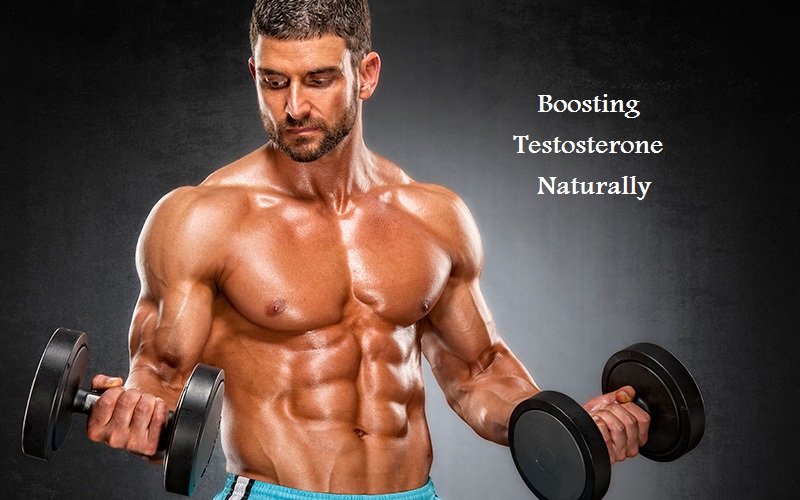
For bodybuilders, boosting testosterone levels is crucial for achieving peak performance and maximizing muscle gains. Testosterone, the primary male sex hormone, plays a vital role in muscle growth, strength development, and overall athletic performance. While there are various methods to increase testosterone, Herbomas, in this article, will focus on natural approaches that can benefit bodybuilders. Read on to discover effective strategies to naturally boost testosterone levels and enhance your bodybuilding journey.
What Is Testosterone For Bodybuilders?

Testosterone, a hormone naturally synthesized by the body, holds significant importance for various physiological functions. Its primary production occurs within the testes in men, while smaller amounts are produced within the ovaries and adrenal glands in women. Notably, testosterone plays a pivotal role in the development of male reproductive tissues, as well as in the maintenance of muscle mass and bone density in both genders.
Within the realm of bodybuilding, testosterone assumes an intriguing role as a potential performance-enhancing substance. Bodybuilders are drawn to the hormone due to its ability to bolster muscle mass, amplify strength, and enhance endurance. By administering testosterone in quantities surpassing the body’s natural production, bodybuilders aim to accelerate the process of muscle growth and facilitate swifter recuperation following strenuous training sessions.
Nonetheless, it’s vital to emphasize that employing testosterone as a performance-enhancing drug is illegal and fraught with severe health repercussions. These consequences span a spectrum of concerns, encompassing liver damage, cardiovascular disorders, and even infertility. Additionally, the usage of such substances can usher in an array of unwelcome side effects, ranging from acne and hair loss to unpredictable mood swings.
It’s incumbent upon us to recognize that resorting to testosterone or analogous performance-enhancing drugs is unequivocally discouraged and harbors significant peril. Rather than pursuing shortcuts that could jeopardize their well-being, bodybuilders, and athletes are better served by focusing on holistic and healthful methods to augment their performance. These avenues involve adhering to a balanced nutritional regimen, engaging in effective training strategies, and affording their bodies ample time for recuperation and rejuvenation. In doing so, individuals can pursue their fitness aspirations without compromising their long-term health and vitality.
Ways of Boosting Testosterone!

1- Maintain a Healthy Lifestyle:
Cultivating a healthy lifestyle serves as the bedrock for fostering and sustaining optimal testosterone levels, which play a pivotal role in numerous aspects of physical and mental well-being. To embark on this journey, individuals are encouraged to prioritize a multifaceted approach that encompasses sleep, stress management, and overall wellness.
Sleep, often dubbed the cornerstone of health, stands as a crucial determinant of hormonal equilibrium, including testosterone production. Striving for a consistent sleep schedule and aiming for 7-9 hours of restorative slumber each night can significantly contribute to hormonal regulation. During sleep, the body undertakes essential restorative processes, including the secretion of hormones, such as testosterone, that aid in muscle repair, cognitive function, and mood stability. Disrupting this delicate balance by consistently depriving oneself of adequate sleep can lead to suboptimal testosterone levels and potentially disrupt other hormonal functions, inviting an array of adverse health outcomes.
Parallel to sleep’s influence, the impact of stress on testosterone levels is equally profound. Chronic stress triggers the release of cortisol, a hormone that, when elevated over extended periods, can impede testosterone production. Therefore, incorporating stress-reduction techniques into daily routines is imperative. Practices like meditation, deep breathing exercises, yoga, or even spending time in nature can have a remarkably positive effect on mitigating stress’s detrimental impact. By engaging in these practices, individuals not only manage stress but also create an environment conducive to healthy hormonal balance.
In essence, the pursuit of optimal testosterone levels necessitates a holistic commitment to wellness. By fostering habits that prioritize ample sleep and stress management, individuals fortify their bodies’ capacity for balanced hormone production. It’s important to remember that these lifestyle adjustments go beyond the singular goal of enhancing testosterone; they reverberate throughout one’s overall health and vitality, promoting physical strength, mental clarity, and emotional well-being.
2- Engage in Regular Resistance Training:
Participating in regular and vigorous resistance training constitutes a cornerstone of strategies aimed at boosting testosterone levels naturally. The intricate interplay between physical activity and hormonal responses underscores the significance of tailoring exercise routines to harness the benefits of enhanced testosterone synthesis.
Intense resistance training, characterized by challenging weightlifting and resistance exercises, has demonstrated a remarkable ability to spur testosterone production. This physiological phenomenon is underpinned by the body’s adaptive response to the stress imposed by weightlifting, wherein it triggers an intricate cascade of hormonal changes. Notably, resistance training activates muscles in a manner that stimulates the release of growth factors and hormones, including testosterone, in a bid to support muscle repair, growth, and overall recovery.
Incorporating compound exercises into one’s workout regimen stands as a particularly effective strategy. Compound exercises, such as squats, deadlifts, bench presses, and overhead presses, engage multiple muscle groups simultaneously. This engagement triggers a robust systemic response that enhances testosterone levels. Executing these exercises with proper form and technique is paramount to both reaping their testosterone-boosting benefits and preventing injuries.
As individuals progress in their resistance training journey, gradually intensifying the workout routine can further amplify the testosterone-stimulating effects. This incremental approach entails progressively increasing the weight lifted, the number of repetitions performed, or the frequency of workouts. Such calculated progressions challenge the body’s physiological thresholds, continually prompting the release of testosterone to support the demand for muscle adaptation and recovery.
In essence, engaging in regular resistance training isn’t solely about sculpting a chiseled physique; it’s a strategic endeavor that harnesses the body’s inherent mechanisms to optimize hormone production. By integrating compound exercises and progressively upping the training intensity, individuals can harness the transformative potential of resistance training to elevate their testosterone levels in a sustainable and healthful manner.
3- Implement High-Intensity Interval Training (HIIT):
In the dynamic landscape of fitness and hormone optimization, the inclusion of High-Intensity Interval Training (HIIT) emerges as a potent strategy to invigorate testosterone levels while redefining cardiovascular fitness. HIIT stands as a multifaceted approach that harnesses the power of brief, high-intensity bursts of exercise punctuated by short recovery intervals. This fusion of intensity and recovery engenders a hormonal symphony within the body that resonates profoundly with testosterone synthesis.
The scientific inquiry into the effects of HIIT on hormone dynamics underscores its capacity to elicit a favorable hormonal milieu. The intermittent surges of intense physical effort characteristic of HIIT workouts activate metabolic pathways and trigger hormonal cascades that contribute to enhanced testosterone production. These bouts of intense exertion, such as sprints or circuit-style workouts, stimulate muscle engagement and cellular adaptation, prompting the release of hormones like testosterone to facilitate muscle growth and repair.
The versatility of HIIT offers a gamut of workout modalities that can be seamlessly integrated into one’s training routine. Sprints, involving short bursts of maximal effort, can be performed on tracks or treadmills. Circuit training, combining a series of exercises targeting different muscle groups, can be executed using body weight or equipment. Customizing the intensity, duration, and recovery intervals of HIIT sessions empowers individuals to calibrate the workout according to their fitness level and goals.
By incorporating HIIT into a weekly training regimen, enthusiasts gain not only cardiovascular benefits but also the potential to elevate their testosterone levels naturally. However, like any exercise regimen, prudence is essential. Adequate warm-ups, appropriate form, and recovery between HIIT sessions are crucial to avoid overexertion and mitigate the risk of injury. With diligent practice, HIIT offers a powerful means to leverage the synergy between cardiovascular fitness and testosterone optimization, culminating in a more robust, energized, and resilient physiological profile.
4- Optimize Your Nutrition:
Within the intricate tapestry of hormone regulation, nutrition stands as a linchpin in orchestrating the delicate balance of testosterone levels. Crafting a well-rounded dietary approach goes beyond mere sustenance; it forms an integral pillar in supporting the body’s intricate hormonal symphony. Unlocking the potential of nutrition to bolster testosterone entails a thoughtful integration of diverse dietary strategies, each weaving a unique thread into the fabric of physiological harmony.
- Consume Adequate Healthy Fats: The role of fats in hormone production, including testosterone, cannot be overstated. Healthy fats serve as the foundational raw materials from which hormones are synthesized. Integrate sources rich in monounsaturated and polyunsaturated fats, such as avocados, nuts, seeds, fatty fish like salmon and mackerel, as well as olive oil. The symbiotic relationship between healthy fats and hormone synthesis underscores their essential role in promoting balanced testosterone levels.
- Increase Protein Intake: Proteins, often revered as the building blocks of tissue, extend their influence beyond muscle repair and growth. Adequate protein intake is vital for supporting optimal hormonal function, including testosterone production. Embrace lean protein sources like poultry, such as chicken and turkey, along with nutrient-dense options like fish and eggs. For those inclined towards plant-based nutrition, legumes, tofu, tempeh, and quinoa provide valuable alternatives.
- Prioritize Micronutrients: The micronutrient landscape boasts a constellation of essential vitamins and minerals that wield a direct impact on testosterone synthesis and regulation. Zinc, an elemental player in hormone production, can be found in foods like lean meats, nuts, and seeds. Vitamin D, renowned for its multifaceted role in overall health, is a potent regulator of testosterone; bask in sunlight or incorporate fortified foods to ensure sufficient intake. Magnesium and vitamin B6, present in leafy greens, whole grains, and nuts, orchestrate vital enzymatic processes involved in testosterone synthesis.
- Limit Sugar and Processed Foods: The modern dietary landscape is punctuated by an array of sugar-laden and processed fare that poses a threat to hormonal equilibrium. Elevated sugar consumption can trigger insulin resistance, ultimately impeding testosterone production. By prioritizing whole, unprocessed foods, individuals pivot toward nutrient-rich sustenance and choose complex carbohydrates, such as whole grains and vegetables, to maintain steady blood sugar levels and foster hormonal resilience.
In weaving these dietary threads, individuals cultivate a nutrition blueprint that resonates harmoniously with the symphony of hormones, propelling them toward balanced testosterone levels and holistic well-being. The alchemical interplay between nutrient-dense foods and the intricate pathways of hormone production underscores the transformative potential of a thoughtfully curated nutrition plan. As the dining table transforms into a palette of hormonal optimization, individuals harness the power of sustenance to sculpt a vibrant, resilient, and harmonious physiological canvas.
5- Maintain a Healthy Body Weight:
The intricate relationship between body weight and hormonal equilibrium, particularly concerning testosterone levels, unveils a compelling narrative that underscores the pivotal role of maintaining a healthy weight within a nuanced spectrum. Navigating this terrain calls for a discerning approach, one that acknowledges the multifaceted impact of body composition on hormonal balance while weaving together scientific insights and individualized strategies.
Excess body fat, often regarded as a harbinger of various health challenges, exerts a notable influence on testosterone levels. Adipose tissue, especially the visceral kind that accumulates around organs, can catalyze the conversion of testosterone into estrogen through the enzyme aromatase. This transformation disrupts the delicate hormonal balance, potentially leading to suboptimal testosterone levels. Conversely, extremely low body fat, a hallmark of rigorous dieting or overtraining, can herald a diminution in testosterone production. The body perceives prolonged energy deficits as a signal to downregulate various physiological processes, including testosterone synthesis, to preserve energy resources.
Navigating the equilibrium of healthy body weight, therefore, involves steering clear of both extremes. Striving for a balanced body composition within a reasonable range aligns with the goal of optimizing hormone balance. This endeavor is not merely about chasing an arbitrary number on a scale; it’s about cultivating an environment where hormonal orchestration thrives.
In the quest to maintain this equilibrium, a personalized and holistic approach is essential. Regularly monitoring body fat percentage provides valuable insights into the evolving tapestry of one’s physiology. Armed with this information, individuals can tailor their dietary and training strategies to align with their unique requirements. Such an adaptive approach ensures that the pursuit of a healthy weight isn’t a linear trajectory but a dynamic journey guided by the compass of individual needs and hormonal harmony.
Embracing a multifaceted strategy, individuals can harness the influence of body weight on testosterone production. By avoiding the extremes of excess body fat and extreme leanness, and instead embracing a balanced approach to body composition, individuals set the stage for optimal hormonal balance, vitality, and overall well-being. As the journey unfolds, the quest for a healthy body weight metamorphoses into a quest for a harmonious dance between hormones and health, each step imbued with intention and grace.
6- Supplement Wisely:
Within the ever-expanding landscape of health and wellness, the topic of supplementation in relation to testosterone levels provokes both intrigue and caution. While certain supplements hold the promise of supporting testosterone production, navigating this terrain mandates a deliberate approach, one informed by scientific understanding and personalized guidance. The fusion of knowledge and prudence underpins a journey that may unveil the untapped potential of supplements, provided they are embraced with circumspection.
In this voyage, it’s imperative to understand that supplements should not be wielded as a panacea for hormonal optimization. Rather, they can be viewed as complementary tools to an overarching strategy that includes lifestyle, nutrition, and exercise. Consulting a healthcare professional emerges as a foundational step, a North Star that illuminates the path toward informed supplementation. These professionals can adeptly consider individual circumstances, health history, and potential interactions to provide tailored recommendations.
Within the realm of supplements that have demonstrated potential benefits for testosterone levels, a trio of contenders garners attention:
- D-Aspartic Acid (D-AA): This amino acid emerges as a temporary ally in the realm of testosterone modulation. Research suggests that D-AA may offer a short-lived elevation in testosterone levels, particularly among individuals with lower baseline levels. However, the extent and duration of this boost warrant further exploration. Consulting a healthcare professional to gauge suitability and dosing is of paramount importance.
- Zinc: This essential mineral plays an instrumental role in testosterone production. The decision to supplement hinges on an assessment of dietary zinc intake. If your nutrition falls short in zinc-rich sources, supplementation could bridge the gap. Again, this decision merits informed guidance to prevent overconsumption, which could lead to imbalances.
- Vitamin D: The sunlit relationship between vitamin D and testosterone levels is an area of ongoing investigation. Deficiency in this vital nutrient has been linked to reduced testosterone levels. A balanced approach involves embracing sunlight as a natural source of vitamin D, while also considering supplementation under the supervision of a healthcare professional.
In a world awash with supplements and promises, the compass guiding these decisions remains anchored in personalized guidance. By involving healthcare professionals, individuals embark on a journey that synthesizes empirical evidence, individual needs, and the potential of supplements. In doing so, the realm of supplementation evolves from a realm of ambiguity into a realm of strategic enhancement, aligned with the broader mission of hormonal harmony and holistic well-being.
Conclusion:
In the tapestry of optimizing testosterone levels and nurturing overall well-being, a comprehensive approach emerges as the hallmark of success. The intricate interplay of factors spanning from sleep patterns and stress management to dietary choices and exercise routines highlights the complexity of hormonal regulation. The insights gathered from these articles underscore that health is not a linear pursuit but a mosaic of interconnected elements that must harmonize to create a resilient and vibrant physiological profile.
In the realm of bodybuilding, where the allure of quick gains may tempt some towards performance-enhancing drugs, the reminder that shortcuts often come with dire health consequences is invaluable. The cautionary note against the use of testosterone or other such substances serves as a stark reminder that true achievement comes from dedication, patience, and natural methods that honor the body’s innate mechanisms. These articles collectively encourage individuals to foster a partnership with their bodies, nurturing strength and endurance through deliberate and healthful choices.
The emphasis on the intricate dance between exercise and hormone optimization highlights the power of the human body’s adaptability. Whether it’s engaging in resistance training or embracing high-intensity interval workouts, the body’s response to these stimuli not only refines physical abilities but also cultivates a hormonal environment conducive to vitality. Similarly, the insightful exploration of nutrition as a catalyst for hormonal balance elevates dietary choices from mere sustenance to a strategic tool that actively shapes hormone production.
In sum, the wisdom imparted by these articles underscores that the pursuit of hormonal balance and optimal health is a holistic endeavor. It’s a journey that intertwines scientific understanding, individualized approaches, and prudent choices. As individuals navigate this terrain with knowledge and intention, they carve a path towards not just elevating testosterone levels, but nurturing a profound sense of well-being that resonates through every facet of life.




